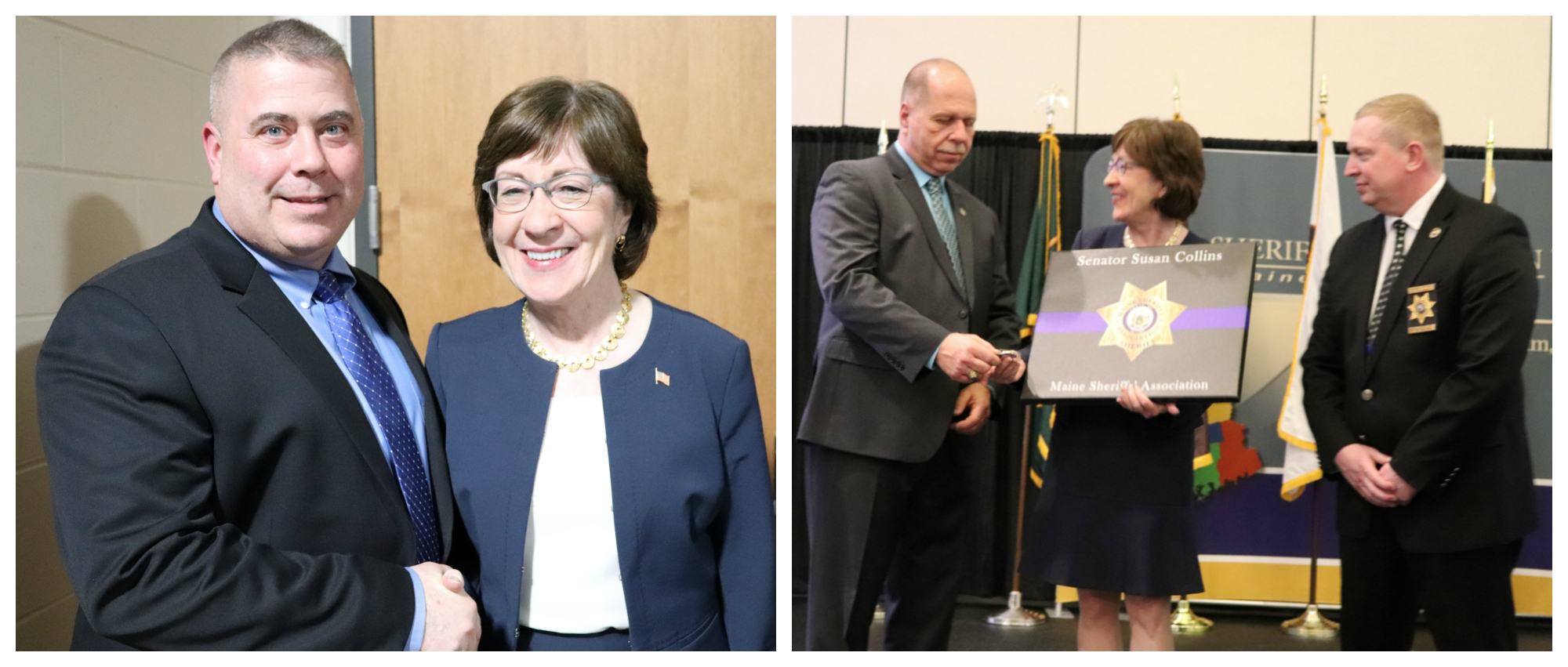Senator Collins Delivers Remarks at Maine Chiefs of Police Association Winter Conference

Click HERE for a high-resolution photo of Sen. Collins delivering remarks.
Click HERE for a high-resolution photo of Sen. Collins with Farmington Police Chief Jack Peck (L) and Maine Chiefs of Police Association Executive Director Edward Tolan (R)
South Portland, ME — Today, U.S. Senator Susan Collins delivered remarks at the Maine Chiefs of Police Association Winter Conference at the DoubleTree Hotel. Senator Collins was introduced by Farmington Police Chief Jack Peck, the association’s president.
“From supporting the Special Olympics and aiding homeless veterans to combatting the scourges of domestic violence, sexual assault, and drugs, Maine law enforcement officials have a deep commitment to the communities they serve,” said Senator Collins. “Law enforcement officers are often described as the ‘thin blue line’ that protects life, liberty, and justice. No matter the color of the uniform you wear, all of you serve on that line with integrity and bravery. It has been a privilege to work with Maine law enforcement officials on many issues over the years, and I look forward to our continued efforts together.”
Last year, U.S. News and World Report once again named Maine as the safest state in the nation. During her remarks, Senator Collins congratulated Maine law enforcement officers on all of their hard work in achieving this accomplishment.
Each year, Senator Collins helps lead the charge for federal funding for the Regional Information Sharing System, or RISS, which helps police investigate multi-jurisdictional crimes. As a senior member of the Appropriations Committee, she has successfully advocated for increased funding to the current level of $38 million – despite proposals to drastically cut the program. Senator Collins also consistently advocates for funding for the COPS and Edward Byrne Justice Assistance Grants programs, which allow state and local law enforcement to hire and train officers, develop innovative policing strategies, and combat heroin and opioid abuse. She has also fought for Operation Stonegarden, which allows Maine law enforcement agencies to work hand-in-hand with U.S. Customs and Border Protection. As a result, Maine’s allocation nearly doubled between fiscal years 2016 and 2018, with almost $1.5 million split among the five Maine counties that border Canada.
Senator Collins has worked with Maine law enforcement officials on many issues over the years, including efforts to combat the opioid epidemic. This year, Senator Collins worked to secure $3.8 billion to combat the opioid crisis in the fiscal year 2020 funding package, building on the $8.5 billion appropriated in the two previous fiscal years. In 2016, Senator Collins championed passage of the 21st Century Cures Act, which created Opioid State Targeted Response Grants that are bringing vital resources for treatment and prevention activities to communities in Maine and across the nation. In addition, Senator Collins co-sponsored the Comprehensive Addiction and Recovery Act (CARA), legislation that expands prevention, law enforcement, treatment, and recovery efforts nationwide. The bipartisan SUPPORT for Patients and Communities Act further strengthened the federal government’s response to this crisis and includes provisions Senator Collins authored that better ensure that unused prescription drugs do not fall into the wrong hands, bolster peer support networks for long-term recovery, and help stop synthetic drugs like fentanyl from being shipped through our postal system.
Senator Collins and Maine law enforcement officials have also worked together to protect seniors from financial exploitation. Last month, Senator Collins chaired the 25th Aging Committee hearing she has held in the past seven years to examine scams affecting older Americans. In January 2019, Kennebunk Police Officer Candice Simeoni testified at an Aging Committee hearing to explain how she has worked to combat elder abuse over her 15-year career in law enforcement.